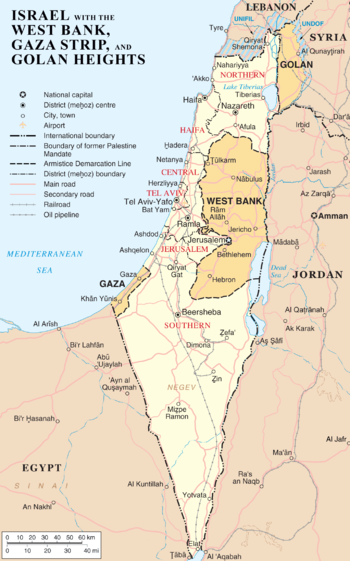 |
| Map of Israel, the Palestinian territories (West Bank and Gaza Strip), the Golan Heights, and portions of neighbouring countries. Also United Nations deployment areas in countries adjoining Israel or Israeli-held territory, as of January 2004. (Photo credit: Wikipedia) |
HAMAS OPTS FOR THE HEZBOLLAH MODEL
According
to Ehud Yaari, Fellow with The Washington Institute and a Middle East
commentator for Israel's Channel Two television, Hamas seems intent on
using Hezbollah's
"bullets plus ballots" approach to gain a military and political
foothold in the West Bank, the PA, and the PLO following the formation
on June 2 of the Hamas and Fatah unity government.
Yaari
warns Western countries to be aware of what is really happening:
instead of the PA regaining its "southern provinces" in Gaza, it is in
fact Hamas reentering the
"northern provinces" in the West Bank.
Read his eye-opening article at
http://washin.st/Sr4Bvo
Sorry for duplicates.
My Commentary:
Hamas'
determination to keep control and expand its independent military
forces has been stressed time and again in its declarations.
Musa
Abu Marzouq, Khaled Mashal’s deputy, called Hamas' weapons a "national
resistance weapon" and stated that any discussion of security issues
would be postponed until
the end of the term of the interim government. Mahmoud al-Zahar said
that Hamas would continue to control its military force in the Gaza
Strip without linkage to the reconciliation agreement. According to a
senior Izz al-Din al-Qassam Brigades figure military
operatives employed by the Hamas administration security apparatuses
would be subordinate to the military wing and not to the ministry of the
interior.
Bassam
al-Salhi, a PLO member of the reconciliation delegation, said that
Hamas would not be asked to disarm (Qudspress.com, May 9, 2014). Abu
Ahmed, spokesman for the
PIJ's terrorist wing, said the Palestinian Islamic Jihad (PIJ) had an
ongoing relationship with Hamas military wing and that the two
organizations had a mutual understanding so that no harm would be done
to the "weapon of resistance" (Quds.net, May 8, 2014).
It should be noted that the PIJ is a strategic and ideological proxy of
Iran, even after the crisis between Hamas and Iran concerning the
Syrian civil war.
The
recent history of President Mahmoud Abbas (Abu Mazen) proves his policy
vis-à-vis the rival Islamist movement has always failed.
After
his election as Chairman of the PA with 62% of the votes in January
2005 he co-opted Hamas to his government instead of fighting it,
although he opposed the violent
intifada and well knew Hamas’ suicide bombing strategy.
His
contentious standing concerning a common Fatah election list led to the
Hamas victory in the January 2006 elections for the Palestinian
Parliament.
His
hesitant policy and lack of charisma enabled the success of the bloody
military coup which brought Hamas to control the Gaza Strip.
A
tired 79 years old leader who threatens to “give up the keys” of the
Palestinian Authority does not look like a serious check for the younger
and aggressive Hamas leadership
striving to emulate the Hezbollah success story in Lebanon.
Nevertheless,
it seems the United States and the European Union are not worried by
the possibility that Hamas will take control of the Palestinian
Authority, with all
what it means for the already slim chances for a negotiating peace
process between Israel and the Palestinians.
The
State Department spokeswoman Jen Psaki declared that Washington
believes Abbas has "formed an interim technocratic government... that
does not include members affiliated
with Hamas" and therefore the US will work with this government.
The
European Union followed the United States by expressing willingness to
work with the new Palestinian Authority unity government on condition
"it sticks to the principle
of peace with Israel based on a two-state solution." British Foreign
Secretary William Hague told his Twitter followers that he reached out
to Palestinian Authority Prime Minister Rami Hamdallah and congratulated
him on the PA’s new unity government with Hamas.
The American declaration was received with disappointment and deep trouble by Israeli officials and Prime Minister Netanyahu.
Time
will tell if this is a new strategic blunder of the United States,
similar to the one which compelled Israel and the Palestinian leaders to
accept Hamas' participation
at the 2006 elections.
It
will be interesting to follow Egypt's position concerning a
Hamas/Muslim Brotherhood stronghold in the Palestinian Authority
imitating Hezbollah and supported by Iran.
Ely Karmon, PhD
Senior Research Scholar
International Institute for Counter-Terrorism (ICT) and
The Institute for Policy and Strategy (IPS) at
The Interdisciplinary Center (IDC(
Herzlyia, Israel
Tel.: 972-9-9527277
Cell.: 972-52-2653306
Fax.: 972-9-9513073, 972-9-7716653
E-mail:
ekarmon@idc.ac.il











No comments:
Post a Comment